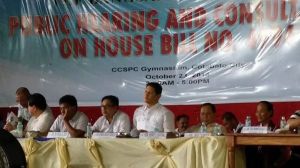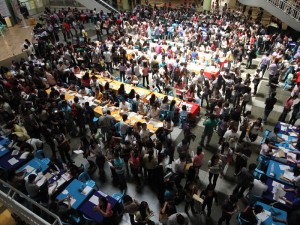
COTABATO CITY, Philippines – Career service employees of the Autonomous Region in Muslim Mindanao (ARMM) eagerly look forward to a planned dialogue with lawmakers on the status of their employment in relation with the ARMM’s proposed replacement with a new Bangsamoro entity.
Members of the ARMM’s rank-and-file personnel, whose appointments were screened and attested by the Civil Service Commission (CSC), want officials of the commission to participate in the dialogue, too.
Lawyer Laisa Alamia, executive secretary of ARMM, on Thursday said Trade Union Congress of the Philippines Partylist Rep. Raymond Democrito Mendoza announced here last week that legislators will dialogue with regional officials and employees on employment concerns amid the impending creation of the Bangsamoro outfit based on the final peace compact between the government and the Moro Islamic Liberation Front.
Mendoza was among members of Congress that held consultations last week in Cotabato City and nearby provinces on the legal ramifications of the draft Bangsamoro Basic Law (BBL), the enabling measure for the creation of a Bangsamoro government based on the government-MILF March 27, 2014 Comprehensive Agreement on Bangsamoro.
“The supposed meeting was to take place this week. It must have been reset. We are just waiting for a notice toward that end,” Alamia said.
Employees of ARMM’s more than 40 line agencies and support offices, whose functions and powers were devolved by Malacanang to the regional government based on the region’s charter, Republic Act 9054, are apprehensive the transition, from the autonomous region to the MILF-led Bangsamoro government, will render them jobless.
Alamia said while ARMM Gov. Mujiv Hataman has continuously been assuring regional employees of protection from the CSC, their feelings and sentiments are something beyond the governor’s control.
“Even so, there is overwhelming support for the peace process from the ARMM’s personnel,” Alamia said.
Last week’s congressional consultations on the draft BBL in Central Mindanao were presided over by Cagayan de Oro Rep. Rufus Rodriguez, chair of the ad-hoc House committee tasked to enact the bill into law.
The ARMM government has no fewer than 30,000 employees, more than half of them working in the region’s Department of Education. - By John Unson (philstar.com)

 MANILA: Many workers in the Philippines and abroad are expected to be displaced next year, labor groups and recruitment industry officials has warned the national government.
MANILA: Many workers in the Philippines and abroad are expected to be displaced next year, labor groups and recruitment industry officials has warned the national government.